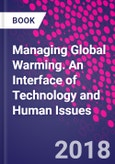Managing Global Warming: An Interface of Technology and Human Issues discusses the causes of global warming, the options available to solve global warming problems, and how each option can be realistically implemented. It is the first book based on scientific content that presents an overall reference on both global warming and its solutions in one volume. Containing authoritative chapters written by scientists and engineers working in the field, each chapter includes the very latest research and references on the potential impact of wind, solar, hydro, geo-engineering and other energy technologies on climate change.
With this wide ranging set of topics and solutions, engineers, professors, leaders and policymakers will find this to be a valuable handbook for their research and work.
Please Note: This is an On Demand product, delivery may take up to 11 working days after payment has been received.
Table of Contents
A INTRODUCTION 1. Why do we have global warming? Professor T M Letcher, 2. Greenhouse Gas Removal, the Numbers Involved Dr. Robert Chris 3. The Present Status of Electricity Generation in the World; how important it is, which industrial methods of electricity generation world uses, how efficient they are, how they interact in an electrical grid Professor Igor Pioro
B REDUCING CO2: FOSSIL FUELS, NUCLEAR ENERGY 4. The Future of Fossil Fuels Trevor M Letcher 5. Nuclear Fission Professor Igor Pioro 6. Nuclear Fusion: what of the Future? Dr Richard Kembleton
C REDUCING GREENHOUSE GASES: RENEWABLES and ZERO CARBON/ CARBON NEUTRAL FORMS OF ENERGY and ELECTRIC CARS 7. The Potential of Renewable Energies Professor Patrick Moriarty and Professor Damon Honnery 8. Hydropower Professor Ånund Killingtveit 9. Solar Energy Dr Lee Phillips 10. Wind Professor Subhamony Bhattacharya 11. Energy Infrastructure and Storage Professor Gareth Harrison 12. Biomass Professor Mirjam Roeder 13. Biomass: Quantifying the Effects of Forest-Based Energy Professor Annette Cowie 14. Hydrogen Fuel, Fuel Cells and methane Dr Johannes Lindorfer 15. Ground Source Heat Pumps Professor Subhamony Bhattacharya 16. Carbon Sequestration Professor Subhamony Bhattacharya
D REDUCING CO2: INDUSTRY, FARMING and IMPROVED EFFICIENCY 17. Plant Derived Chemicals including Plastics as a way of Reducing GHG Pollution Professor Janet L Scott 18. Reduce CO2 Pollution by Investing in CO2 as a Chemical Feedstock (CH4?) Professor Peter Styring 19. Greener farming: managing carbon and nitrogen cycles to reduce GHG emissions Professor Nic Lampkin and Dr Laurence Smith
E GEO-ENGINEERING 20. Geo-engineering (sunlight reflection methods (SRM); negative emissions technologies (NET) and greenhouse gas removal (GGR)) Dr Renaud de Richter
F ENVIRONMENTAL and HUMAN ISSUES 21. Ethics of Geo-engineering Clare Heyward 22. Economics of Climate Change and Global Warming Professor Peter Howard 23. Migration and Climate Change Dr Andreas C Simonelli 24. Social Justice in Climate Change Ms Alice Venn 25. Economics of Geo-engineering Professor Juan B Moreno Cruz 26. Justice in Managing Climate Change Professor Ivo Wallimann-Helmer 27. Local Actions and Personal Actions Dr Phil Ireland








